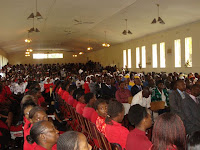From Anglican Information
In our last release we reported that the Court of Confirmation for the new bishop of Upper Shire, The Rev’d Brighton Malasa would be held on 3rd March. In fact it will be held on Sunday 1st March in Bulawayo, Zimbabwe. This is as far away from the Diocese of Upper Shire as the provincial bishops can manage, in order to avoid protests at their unpopular choice of candidate who is seen as an imposed choice.
A correspondent writes from Upper Shire:
‘The bishops issue is still in tense situation here. Confirmation in Bulawayo, Zimbabwe! - on 1st March 2009, but the question is why are they confirming a bishop when people in the diocese have raised issues concerning the imposed bishop’s morals?These parishes have written against the proposed bishop: Malindi, Chinamwali, Nkope, Monkey Bay, Liwonde, Zomba (St. George’s), Mangochi Boma and his own cathedral parish. All these parishes make the same claims against him regarding drunkenness, sexual immorality and misuse of church funds.’
ANGLICAN-INFORMATION observes that these are very serious allegations, from a large number of the parishes in Upper Shire, against Malasa who will become the world’s youngest bishop if the consecration goes ahead.
=============
Whatever happens this cannot be good. What happens when the shepherds play dice with one another and ignore the sheep? What is the purpose of bishops separated from the people?
But, of course, if you were once Archbishop Malanga's chaplain, these questions will probably not weigh heavily in your prayers.
Presumably Brighton Malasa will have to be installed in his Cathedral as a symbol of unity of the church in Upper Shire and of the unity of the worshipping people with the church universal. He won't be the first bishop to be consecrated in the teeth of fierce opposition, and sometimes the local people have come to love a bishop they first opposed. But on the whole such opposition has been based on doctrinal division not accusations of personal impropriety; difficult appointments have been made where, taken by and large, the college of bishops were respected even if the individual was not. The prognosis here cannot be good.
To push through this appointment against such local opposition, not even, so far as I can see, taking opposition seriously enough to address and counter it, is a recipe for division and schism. Anglican polity is such that the only real power the laity have is to leave, to the diminishment of all concerned.
.



 This is the map of how important religion is to the residents of the couyntries polled.
This is the map of how important religion is to the residents of the couyntries polled. 





















 image of power and authority. It's for sale.
image of power and authority. It's for sale. 




